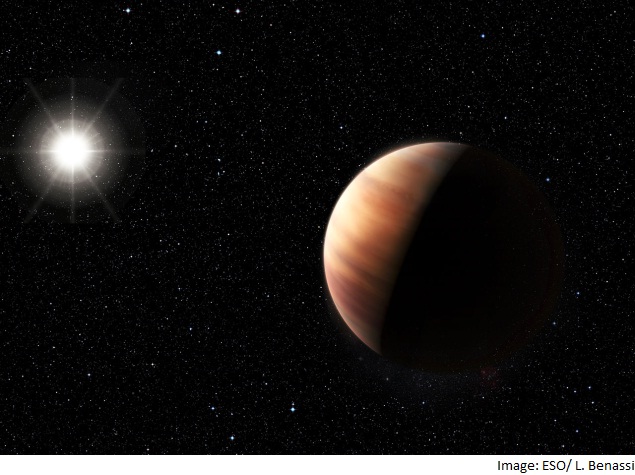- Home
- Science
- Science News
- Jupiter's Twin Spotted Around Sun's Twin
Jupiter's Twin Spotted Around Sun's Twin

According to the most recent theories, the arrangement of our solar system was made possible by the presence of Jupiter and the gravitational influence this gas giant exerted on the solar system during its formative years.
Finding a twin of Jupiter is an important milestone on the road to finding a planetary system that mirrors our own, the researchers said.
The planet's host, the solar twin named HIP 11915, is not only similar in mass to the Sun but is also about the same age.
To further strengthen the similarities, the composition of the star is found to be similar to our Sun.
"The quest for an Earth 2.0 and a complete solar system 2.0 is one of the most exciting endeavours in astronomy. We are thrilled to be part of this cutting-edge research," said lead researcher Jorge Melendez from the Universidade de Sao Paulo, Brazil.
"This discovery is a sign that other solar systems may be out there waiting to be discovered," added Megan Bedell from University of Chicago in a paper that appeared in the journal Astronomy and Astrophysics.
The discovery was made using High Accuracy Radial Velocity Planet Searcher (Harps), one of the world's most precise planet-hunting instruments at the La Silla Observatory in Chile.
Although many planets similar to Jupiter have been found earlier, this newly discovered planet is the most accurate analogue yet found for the Sun and Jupiter.
"HIP 11915 is the most promising candidate so far to host a planetary system similar to our own," the team said.
Catch the latest from the Consumer Electronics Show on Gadgets 360, at our CES 2026 hub.
Related Stories
- Samsung Galaxy Unpacked 2025
- ChatGPT
- Redmi Note 14 Pro+
- iPhone 16
- Apple Vision Pro
- Oneplus 12
- OnePlus Nord CE 3 Lite 5G
- iPhone 13
- Xiaomi 14 Pro
- Oppo Find N3
- Tecno Spark Go (2023)
- Realme V30
- Best Phones Under 25000
- Samsung Galaxy S24 Series
- Cryptocurrency
- iQoo 12
- Samsung Galaxy S24 Ultra
- Giottus
- Samsung Galaxy Z Flip 5
- Apple 'Scary Fast'
- Housefull 5
- GoPro Hero 12 Black Review
- Invincible Season 2
- JioGlass
- HD Ready TV
- Laptop Under 50000
- Smartwatch Under 10000
- Latest Mobile Phones
- Compare Phones
- Vivo Y500i
- OnePlus Turbo 6V
- OnePlus Turbo 6
- Itel Zeno 20 Max
- OPPO Reno 15 Pro Mini 5G
- Poco M8 Pro 5G
- Motorola Signature
- Vivo Y50e 5G
- Lenovo Yoga Slim 7x (2025)
- Lenovo Yoga Slim 7a
- Realme Pad 3
- OPPO Pad Air 5
- Xiaomi Watch 5
- Huawei Watch 10th Anniversary Edition
- Acerpure Nitro Z Series 100-inch QLED TV
- Samsung 43 Inch LED Ultra HD (4K) Smart TV (UA43UE81AFULXL)
- Asus ROG Ally
- Nintendo Switch Lite
- Haier 1.6 Ton 5 Star Inverter Split AC (HSU19G-MZAID5BN-INV)
- Haier 1.6 Ton 5 Star Inverter Split AC (HSU19G-MZAIM5BN-INV)

















